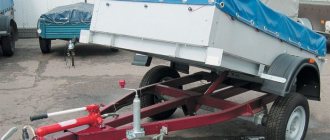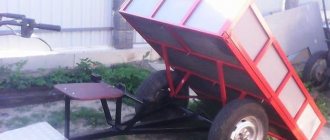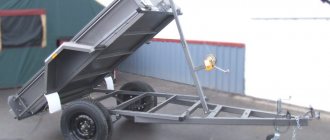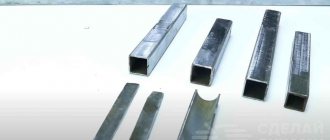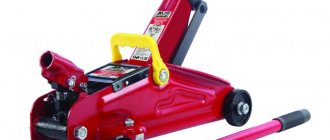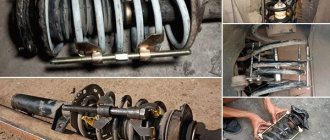A homemade trailer-trolley for transporting a car on a rigid coupling was assembled by Wild Tatar. A photo and video review of the design is presented below. It is better and more reliable to transport a broken car to a repair site using a rigid hitch, and a rolling trailer was invented specifically for this purpose.
The principle of rolling is that the transported vehicle runs over it, and the wheels are fixed in special openings welded from a square pipe and additionally tightened with a stripper.
The wheels of a dolly trailer steer and follow the path of the tractor, this is done thanks to steering rods installed and connected into a single structure with the trailer drawbar.
The maximum width along the outer rim of the wheels is 1840 mm. Weight 96 kg, disassembled into parts 1300 mm long, R-13 tires, bolt pattern 4x98. Hitch head for 50 mm ball. Hand winch and two ladders.
Materials
- steering knuckles VAZ classic
- hubs with bearings VAZ-2108
- profile pipe 100x100 mm
- drawbar 60x60 mm
- steering rods
- tips and ball VAZ
And so, let's carefully look at the material provided.
The dolly trailer is designed for towing passenger cars using the partial loading method. The dolly trailer must be transported disassembled, otherwise at the first traffic police post you will be issued a fine, because... A trailer without a car will be considered a trailer. with all that it implies. During the design, emphasis was placed on turning the wheels, because Without swivel wheels, there is a skid when towing a car. There are photos of tests and the product itself. PS Special THANKS to users: sanfox for the 3D model “VAZ wheel hub. " and Dimka_88 for "Winch Q=0.5t". And also to the user of a BMW 8 series from an automobile site from Chelyabyansk. Basically it was his idea. I just tried to turn simple sketches into drawings, and them into a product with testing and subsequent operation.
Composition: 3D parts and assemblies. Details, specifications, assemblies. STEP file, Info files (images)
Software: KOMPAS-3D 16.1
Date of: 2018-09-17
Views: 1 145
10 Add to favorites
A trailer is a vehicle that does not have an engine installed. It is designed to travel in conjunction with a car. Despite the apparent complexity of such a device for transporting goods, it is not difficult to make a trailer with your own hands. For successful work, you need to choose the right parts and materials, make sketches or drawings.
How to make your own towing trailer
No motorist is insured against serious vehicle breakdowns, when it is impossible to do without outside help to deliver it to the garage or to the place of repair. And since tow truck services are quite expensive (a kilometer rate is usually used), transportation even over short distances can cost a pretty penny. Domestic Kulibins have found a way out. This is the use of a homemade dolly, which is a cheap alternative to a tow truck.
Top beam
For this we will need:
- two 32 mm corners 171 cm long;
- sheet metal strip 64 mm wide;
- several bushings.
We assemble the corner into a U-shaped profile, that is, a channel. On one side in the middle we weld a metal insert 3-4 mm thick and 16 cm long, which is needed for using different jacks. We weld the plate on top with tacks, sew everything together and get a rectangular profile.
We weld the insert to the plate, and on the reverse side we jam the profile with a metal plate 4-5 mm thick, scalding around the perimeter and cleaning it. We weld a sleeve of the following dimensions to the end in the middle:
- length 35 mm;
- internal diameter 20 mm;
- external 35 mm.
In front of the upper beam we weld two guides for the jack with holes for the jack stopper. You need to insert an M8 bolt with a nut into them. We also weld a bushing with rollers and a safety pin on the top part.
Types of trailers for transporting passenger cars
Possession of such a device provides the opportunity to use your own budget version of a tow truck in case of urgent need.
Let's look at the main types of such units:
- frame carriage based on a two-axle bogie. Such a car transporter looks like an overpass, since its side platforms are made of perforated metal. As a rule, the automotive version is characterized by the presence of a 10% bevel in the front or rear, and sometimes on both sides. The modification for transporting boats and boats is structurally simpler - it is a simple metal frame with longitudinal holders that serve to secure the vessel. Both options include a wheel gripping device, stoppers, a winch, and ramps for accessing the frame;
- The carriage platform is a monolithic structure, equipped around the perimeter with devices for securing transported vehicles, mobile ramps, as well as a ladder located at the rear of the platform. The advantage of this design is stability when the vehicle’s center of gravity is not located in the center of the carriage. The absence of sides allows you to transport cargo of any geometry. Equipped with devices that facilitate fixing and loading/unloading the vehicle;
- a carriage trailer, which by and large is not a tow truck. In most cases, this is a device for transporting boats or motor equipment. It differs from the previous option in the presence of shelter, which can be present in the form of a soft waterproof awning or a plastic canopy;
- A flatbed trailer may have a frame structure with ramps or a solid floor. The sides can also be solid or framed. The flatbed trailer occupies an intermediate position between the trailer and the platform;
- a rolling trailer having a single-axle design. The front axle of the transported passenger car is loaded onto its fixing planes, while the rear wheels remain on the road surface. This trailer, called a dolly, is characterized by its simple design and compact dimensions. A turning mechanism is not needed here; the only additional equipment needed is a device for fixing the wheels of the transported vehicle.
According to technical characteristics, homemade trailers can be classified as follows:
- single-axle devices are designed to transport one vehicle weighing up to 2000 kg. or two copies of motor vehicles such as ATVs or scooters with the same weight limit. The optimal dimensions of such trailers are 5.0 x 2.0 meters, the height of the sides, if present, does not exceed 2.5 cm;
- biaxial ones have a wide range of load capacity (from 1 to 8 tons). They have dimensions ranging from 1.75-4.50 m in width and 3.25-7.00 m in length. Loading height ranges from 50-85 cm. Oversized trailers can be used to transport two passenger cars or 4 motorcycles;
- trailers with partial loading are designed for the delivery of passenger cars; their payload does not exceed 600-700 kg, which imposes certain restrictions on the weight characteristics of the transported vehicle - its weight should not exceed 1500 kg. A typical representative of the class is a dolly trailer.
Types of motorcycle stands
Today, tackles have proven themselves to be very convenient devices for repairing and servicing a bike. Every motorcycle owner who has had to repair their equipment has thought about purchasing such a device. The tackle allows the owner of the iron horse to install it very steadily for repairs. The roller is very convenient when changing a wheel - it allows you to hang the motorcycle and thereby easily remove the wheel.
We can say that a homemade stand is a do-it-yourself motorcycle stand, only without a table. If there are wheels, the lift can easily be moved to a given location for repairs. The small dimensions of the device allow it to be used in places with limited space.
- rear - for servicing the rear of the motorcycle;
- front - for servicing the front of the motorcycle.
The front type lift comes with an adapter that allows you to hang the wheel for repairs. The adapter is selected for a specific bike model. This tool is suitable for repairing the front fork. A do-it-yourself car tray is ideal for storing cars in the winter. It has a simple design and does not require special knowledge to operate it.
The rear type tackle is a little more structurally complex. It features an L-shaped device with a handle. It is equipped with clamps whose task is to securely hold the wheel. The width of the clamps is selected for a specific wheel. Such tackles are mainly used by repair services, as they allow lifting weights of up to 300 kg. With the help of such a tackle, you can hang the motorcycle in such a way that the suspension is maximally unloaded. Thanks to this feature, it is quite easy to replace the chain.
Making a do-it-yourself trailer
The manufacture of any technical device requires a design stage. To make a do-it-yourself trailer, you will also need drawings. Even if you consider yourself a competent specialist, you should not assume that you can do the job by eye. The slightest mistake can result in the trailer being unusable.
Let's give an example of assembling a structurally simple rolling trailer. For this we need:
- square pipe;
- channel;
- thin-walled steel sheets;
- thicker sheet steel for the bottom;
- a pair of wheels;
- assembled chassis parts;
- suspension parts;
- towbar;
- brake system;
- waterproof fabric;
- brackets and corner fasteners;
- a set of tools (screwdriver, grinder, drill);
- welding machine.
Having collected all the necessary components, you can begin making the trailer. Approximate assembly algorithm:
- the basis of the entire structure is the frame. It must be strong enough to withstand the load from the front of the vehicle being transported. Made from pipes by welding. If you have experience in this matter, you can try making the frame yourself. But since this is a very responsible operation, it is better to entrust the work to a professional welder. The main thing is to carefully check the welds; they should not contain defects;
- a rectangular frame, no matter what pipes it is made of, does not have sufficient rigidity to withstand lateral loads. Therefore, it is strengthened with ribs made of channels, which are welded across the frame. The most reliable scheme is triangular, that is, two channels are welded to one of the transverse pipes together, and the other ends are welded on the opposite side at the corners, that is, a triangle is obtained. It is necessary to mount brackets along the edges, the purpose of which is to fix the shock absorbers;
- it is better to purchase a coupling mechanism from a store, and not so much to speed up the work process, but to simplify the registration of the tow hitch;
- the axle of the rolling trailer is not located in the middle, but offset to the rear of it;
- the next step is to equip the device with a passive braking system. It will prove indispensable when the trailer stands on an uneven surface with a decent gradient;
- Now you can start installing the bottom and installing the sides. Where bolted fasteners are used (for example, to connect sheets together), the bolts must be reliable. The side and front sides are welded rigidly using angles, and the rear one must be hinged, so we install it using a movable structure. In addition, it must be equipped with reflectors, lights and a frame for installing a license plate. Orange reflectors will be required on the side sides, white and orange - on the front;
- All that remains is to install the wheels, as well as provide a mechanism for fixing the wheels of the transported vehicle - and our towing trailer is ready.
Do you need documents for such a simple tow hitch? According to the traffic rules, yes, so registration of the trailer will be required, and this is the most difficult part of the work. Problems may arise due to clause 20 of the Rules (prohibition of towing on a homemade trailer not equipped with brakes), but there is one nuance here: you can transport a vehicle that weighs half as much as the towing vehicle. When registering, you can say this: I intend to use the trailer to tow a small car.
Car jack with homemade hydraulic system
Some home craftsmen come up with completely homemade designs - that is, without the use of hydraulic or mechanical jacks. However, in most cases, such homemade devices do not justify themselves.
One of these devices for lifting a car was made by the author of the YouTube channel K i.
To make the frame of the structure, the author used metal profile pipes. A wheel axle is welded to the bottom of the frame, onto which two wheels are placed. Furniture wheels are attached to the opposite end of the base.
The author made the hydraulic system from plastic sewer pipes, a silicone hose, fittings and a piston. All elements of the system are interconnected. Attached to the frame.
From a piece of round steel pipe, the author made a handle that connects to the piston.
The frame and handle will need to be painted (all welds must first be cleaned), after which you can begin the final assembly of the lifting device.
The assembled structure should not be taken seriously, since it is not able to fully compete with mechanical and hydraulic rolling jacks.
And most importantly, there is no safety when using this device. In general, a rather dubious design.
The step-by-step process of making a jack with a homemade hydraulic system, as well as the principle of its operation, is shown in the author’s video.
New dispute over toll roads: how dolly towing became a road train
They say that a person gets used to everything. This seems to be what happened to motorists and the BelToll road toll system: the process is underway. True, even 4 years after the launch of the system, controversial situations do not cease to arise, and practice continues to reveal “blind” spots in the legislation.
Alexander contacted the ABW.BY editorial office. Due to his professional activities, he regularly has to tow cars to filming locations. To do this, he uses a self-designed rigid coupling device based on the dolly principle. And this type of towing has never caused any complaints either from the traffic police or from the employees of the Transport Inspectorate. But the BelToll system has some questions.
“The dolly I use is used for rigid towing. Since the weight of my towing vehicle exceeds 3,500 kilograms, to drive on toll roads I make payments through the BelToll system, independently setting the number of vehicle axles on a special device. I have two such registered axes. I have always approached these issues and approach them extremely responsibly, and so far I have not had any problems. Therefore, the message about non-payment of BelToll services caused some confusion. And this is what happened.
In August 2016, I towed a GAZ-21 Volga car. The notice issued at BelToll payment points clearly states that towing may require either additional axles on the device if we are talking about partial loading, or installing an additional on-board unit if a rigid or flexible hitch is used.
I logically assumed that I would use the rigid coupling method. And since the towed Volga is exempt from tolls on Belarusian toll roads, there is no need to install an on-board unit on it.”
But the system operator obviously thought differently. Alexander received a notice of violation and a requirement to pay an increased fee. In response, he entered into correspondence with Kapsh Telematic Services LLC. And although the answer received did not convince the car owner, who is still confident that he was right, Alexander paid the required money.
Let's try to figure out where the truth is and whether the owner of the homemade dolly was really wrong?
Operator: dolly - trailer as part of a road train
In his response to Alexander, the system operator cited three definitions from the Interstate Standard “Road Transport”:
- Trailer is a vehicle without an engine, intended for the transport of passengers or goods, the vertical load of which is transmitted to the supporting surface through the wheels and is adapted for towing by a car.
- Combined vehicle (CV) is a power-driven vehicle coupled to one or more towed vehicles. One type of combined vehicle is a road train.
- Road train is a vehicle connected to one or more trailers using a coupling device.
Based on these definitions, the system operator is convinced that the dolly is a trailer, and the entire structure of vehicles moving that day is a road train. “Consequently, the number of axles when towing using the above method on the electronic payment device of the towing vehicle must be set to 4 or more,” the operator concluded.
Register your cart?
It is worth recognizing that the operator’s position is by no means indisputable. Let's study it with all pickiness.
The first question we ask ourselves is what is a trailer?
Paragraph 2.54 of the Traffic Regulations interprets a trailer as a vehicle intended to be driven in conjunction with a power-driven vehicle. Unfortunately, this is too short and streamlined a definition.
Therefore, let us once again return to the wording of the Interstate Standard “Road Transport”, which is operated by Kapsh Telematic Services: “A trailer is a vehicle without an engine, intended for the transportation of passengers or goods...” Here we will pause and read more carefully: “... for the transportation of passengers and cargo." Where is the word “towing” here?
Judging by the interpretation of the interstate standard, the trailer is not intended for towing in any way and accordingly cannot be used for these purposes.
Let's go even further and look at the resolution of the Council of Ministers of the Republic of Belarus No. 1849 dated December 31, 2002 “On approval of the regulations on the procedure for state registration and state registration of vehicles, deregistration and amendments to documents related to the registration of vehicles.” Paragraph 8 of this document requires mandatory registration of trailers.
According to the logic of the BelToll operator, it turns out that the dolly is subject to registration with the traffic police and obtaining registration plates? This is something new.
And in general, if you look at the schematic representation of the road train, it in no way corresponds to Alexander’s design.
New towing method
The operator's position can be criticized on another basis.
The rules name only three methods of towing: flexible hitch, rigid hitch and by partial loading onto the towing vehicle.
Chapter 25 of the traffic rules “Towing motor vehicles” says: “188. Towing of a power-driven vehicle is carried out using a hitch (flexible or rigid) or by partially loading it onto the towing vehicle.”
Meanwhile, the operator has some new “method of partial loading onto a vehicle with a trailer (road train).”
By this logic, it turns out that the towing vehicle was a trailer, which in our case is actually a dolly?!
And if you inadvertently take a closer look at clause 193.3 of the traffic rules, you will find out that towing other vehicles by road trains is generally prohibited by law.
In addition to the inconsistencies that arise, this begs the question: why does the BelToll operator determine any other methods and methods of towing vehicles besides those that already exist and are enshrined in law? Still, whatever one may say, the way Alexander towed the GAZ-21 is more suitable under the concept of “rigid coupling.”
Our hero tried to graphically represent the newly invented method of partially loading a towed vehicle, and this is what came out of it:
I wonder what the traffic police think about this issue?
Looking for other opinions
As a result, we see a picture where everyone interprets the same concepts in their own way, which makes it possible for manipulation in the interests of either party. But we naturally would like a simple answer to a simple question: should a dolly be considered a trailer?
Previously, the editors of ABW.BY, at the request of readers, tried to help understand a similar situation and for this purpose sent a request to the State Standard of the Republic of Belarus
Trawl trailer - tow truck for passenger cars: design options, models
Hello, dear friends! Today I decided to discuss this type of trailer vehicle as a passenger trawl trailer. Please note that we are talking specifically about passenger models intended for transporting the corresponding category of cars and other wheeled vehicles.
Many motorists know what a tow truck is. These are special services with the help of which they not only help you out in difficult situations, but also help with transporting your car for various purposes. This could be sending for repairs, delivery for painting, transportation to another location, etc.
But you also know the price of such services. Tow truck operators measure the cost by the number of kilometers. Therefore, even over relatively short distances, the cost of transportation is impressive.
Therefore, car owners often decide to buy a trailer for a passenger car for personal use. I will not talk about the goals and necessity of such a vehicle. There are too many situations where such a solution could be useful.
Rack
We make it from a 32 mm corner with a length of 1540 mm (you will need 4 pieces in total). You will also need 4 36 mm corners of the same length. We assemble the corner into a square using welding seams 30-40 mm long. When assembling we use clamps. After connecting the corners, you need to drill holes in the lower part of 26 mm in diameter, retreating 31 mm from the edge. This will leave you with 5mm left for welding the metal rod inside the structure. Next, drill 13mm holes:
- one at a distance of 100 mm;
- the next after 80 mm;
- the third and all subsequent ones after 190 mm.
Just something complicated
If we talk about passenger cars, there are, as it seems at first glance, many different types of trailers used for transporting cars.
What can you usually encounter? These are vehicles such as:
- car transporter;
- towing trailer;
- trawl;
- carriage.
So many names. We know how to make something complex out of a simple thing. So it is in our situation. For one category of trailers they came up with such a scattering of names.
I'll tell you right away. Behind all these designations lies the same type of vehicle trailer, aimed at passenger cars.
After all, ordinary tow trucks have a special loading area, additional equipment, lifting mechanisms, cranes, etc. But since we are talking about the transportation of passenger vehicles by passenger cars, you can use all these names equally correctly.
Tipper installation
We stretch the support platform for the car tipper with our own hands under the bottom of the car. In this case, we place the place for fixing the heel for the jack on the side that must be raised. We insert a support corner on top and fasten it to the platform with a bolt. Next, we assemble and insert the support beam into the fixture. First, remove the caps from the wheels to which it will be adjacent.
The heel for the jack is inserted between the platform and the support angle, then a rail with a number of through holes is vertically inserted through all three parts. It serves as a guide and retainer for the top of the inverter. The lower end of the rail is screwed to the platform with a bolt. We lubricate the sections of the support corner profiles along which the platform will move with grease and only then install it, moving it under the bottom of the car.
Next, attach a jack to the tipper and begin lifting. After the desired height is reached, a cotter pin is inserted into the vertical rail through the hole located directly under the support angle. It will prevent the car from falling if something happens to the jack. The following video describes in detail how to install a homemade car tipper with your own hands.
Design features
Light carriages or trawl trailers are an alternative to car recovery services. With the help of such a trailer, you can get your own tow truck with similar capabilities and efficiency for little money.
They all have design differences, due to which they are divided into two large categories:
- partially loaded trawls (also known as rolling trawls);
- passenger tow trucks with a full load.
In the first case, we are dealing with a trailed single-axle vehicle, onto which only the front axle of the vehicle is loaded. The rear wheels remain on the road surface and rotate, covering the required distance.
Partial load carriages differ:
- compact sizes;
- simple design;
- affordable price;
- necessary equipment for fixing a pair of wheels.
Some models are even collapsible, which allows you to transport them in the trunk of a car and use them as needed. Their important advantage is the fact that there is no need for mandatory registration. All other types of carriages must be registered with the traffic police.
Moreover, their carrying capacity is up to 600-700 kilograms. This indicator allows you to transport cars whose weight does not exceed 1500 kilograms or 1.5 tons. That is, some limitations are already visible. It is also important that the dimensions of the car do not exceed the established standards for a tow truck.
The second option is much more attractive if we talk about the frequent use of a passenger tow truck. Fully loaded carriages come in a variety of designs, which have a wide range of additional equipment. In its simplest form, it is a platform onto which the machine is rolled up using removable ramps, or folding gangways, a cable drive and a lever system are used. Next, the car is fixed on this platform and taken where you need it.
Full load allows you to choose between two-axle trailers. It is better to choose designs with two axles, since their load capacity is up to 3500 kilograms. And this is almost any passenger car, crossover or large SUV.
Homemade rolling jack from a bottle
The most popular designs are based on a hydraulic drive, which is a bottle jack. Its carrying capacity must be at least 3-5 tons. Preferably more.
The idea of making a rolling jack belongs to the author of the YouTube channel Mr Novruz.
The jack structure consists of:
- support frame (bed);
- lever;
- hydraulic drive;
- stop
racks;
To make the main structural elements (support frame, vertical post and lifting arm) you will need thick metal.
In this case, the master uses a channel. We mark and cut the pieces to the required size. We weld a vertical stand to the supporting frame (we install the workpieces perpendicular to each other).
We cut four pieces of square rod and weld them to the base - this will be the “seat” for the bottle jack. We weld a handle-bracket made from a square rod to the outside of the rack.
The author welds a mount with a roller to the front of the frame so that the structure can be conveniently moved in the garage and on the street.
Instead of a roller, you can install a pair of wheels. Some craftsmen install two pairs of wheels, but one will be enough. By the way, you can make the wheels yourself.
Popular models
If you are looking for a good tow trailer for a passenger car, you should focus on trusted manufacturers. Try to carefully study the technical characteristics of a passenger tow truck, compare it with the planned tasks and look for the optimal price-quality ratio.
Among the most popular and widespread brands under which the trailers we are considering today are produced are the following:
- Pragmatec;
- Bren;
- Rydwan;
- NPP Palych;
- Verda, etc.
I won’t go into the details of the manufacturers. Still, the assortment is very large, it is problematic to dwell on something specific. Much depends on what and for what purposes you are looking.
But the most important thing is that the tow truck matches the size and weight of the vehicles you intend to transport with it.
If we talk about the choice between full and partial load, then here I would give preference to full-fledged two-axle models. They have greater load capacity, functionality, can be equipped with a wide range of components, and are also easier to operate. Driving with carriages for partial loading, when the towed vehicle rests with two wheels on the road surface, is extremely difficult and responsible. Especially when the speedometer needle exceeds 70 kilometers per hour.
Selecting a Factory Lift
The first thing you should pay attention to when choosing a stand in a store is the manufacturer of the device. The manufacturer must certify its product and provide all quality guarantees for the device. Factory lifts undergo a series of safety and operational tests. Branded products must comply with GOST standards. Good expensive lifts are made from quality materials using modern technologies. Therefore, it is very important to choose the right model.
The motorcycle lift industry is evolving along with technological progress. New production technologies are emerging, new materials for manufacturing are being developed. Competition among manufacturers leads to the emergence of more functional and easier-to-use devices.
Branded tires are increasingly being used by professional riders around the world. The presence of a large number of additional accessories can significantly expand the capabilities of these devices and simplify their work. A modern lift can be operated by one person and allows you to lift a heavy rear end, securing it securely.
Where to buy and how to get it
There are a large number of special purpose trailers. These include:
Of these, only a platform trailer can be considered a slightly closer option to a carriage.
Let's assume that you need a tow trailer for a passenger car. How to get it? There are several main options:
- buy a used trailer;
- to rent ;
- borrow from a friend;
- buy a new car transporter.
You know my attitude towards used trailers. Therefore, this is not the most optimal option. The attractive price of a used trawl can hide a lot of hidden problems.
Renting is relevant for those who need a gun carriage extremely rarely, literally several times during the year. Then the costs of purchasing a new vehicle will not be entirely justified.
Borrowing from friends is not the most attractive option. Friends can’t always lend you their tow truck; it’s busy, or you’ll have to answer for it later. As practice shows, it is generally recommended not to have any affairs related to money and debts with friends. Friendship is more valuable.
But if you need a car transporter on a regular basis, then it is best to purchase it from a trusted manufacturer. This is a guarantee that production is carried out in accordance with all norms and standards. You will receive the carriage in the required configuration, with guarantees and other benefits of new trailers.
I almost forgot about the DIY assembly. Self-production is attractive only because of the potential savings. But you will still have to buy aluminum ramps for special equipment (loading is carried out on them), a winch, a support wheel and other components. But the biggest problem with homemade trailers is the difficulty of registering them. That's why I don't recommend getting involved.
I'll stop there. I hope I answered the question in detail and provided all the necessary information. Using the attached photos, you can further understand the design features of the carriage, tow truck, trawl, etc. As you remember, the essence does not change from the name.
Thank you all for your attention! Subscribe to our website, leave comments, ask questions and invite your friends to join us!
CONTACTS
Please note that you can rent a trailer on the day of your request only if there are trailers free of armor. If you want to be guaranteed to rent a skateboard for a specific date or on weekends, holidays and pre-holidays, make your reservation in advance.
For questions about purchasing a car rental - tel. 8 (917) 527-6016
OUR ADDRESS
Russia, Moscow, Sorge street, 21 building 3
WE ARE ONLINE
OUR PHONES
DAILY, WITHOUT HOLIDAYS AND WEEKENDS from 9 to 21!
8 ( 917 ) 527 6016 8 ( 977 ) 877 1013
